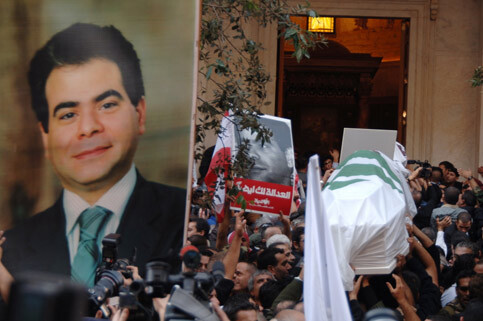Electronic Lebanon 23 November 2006

The mass funeral of Lebanese minister Pierre Gemayel, Beirut, 23 November 2006. Crowds carrying flags and chanting anti-Syrian slogans converged in central Beirut, turning the funeral into an impassioned political rally. (Dina Debbas/IRIN)
IPS - The assassination of Christian Maronite leader Pierre Gemayel does more than strike a blow to a fragile Lebanese government just trying to survive: it raises fears of sectarian violence with painful memories of a devastating 15-year civil war still fresh.
And, on a regional scale, it does nothing to advance new thinking to involve Syria and Iran in search for an end to spiralling violence in Iraq.
If normalcy can be restored in Lebanon after the shock, anger and unease in the aftermath of the slaying, it may be thanks to a sense of national identity. “Lebanese people had one civil war (1976-1991, between Christian militias and Muslim groups) and I don’t think they want another one,” John Lawton, an observer of Lebanese affairs since his reporting days in the 1960’s told IPS. “The war’s damage was more than just material.”
Instead, he said, the “strong Lebanese identity” of feuding factions may play a critical role in helping Lebanon overcome the latest crisis. Lebanon has a population of about four million, with about 60 percent Muslim and 40 percent Christian.
The first words of Amin Gemayel, the grieving father and a former president, were: “We don’t want reactions and revenge.”
Much depends on what kind of government now takes shape. Six of 24 ministers, mainly Shia including from Hezbollah, had quit the government before the assassination as all- party talks on power sharing dissolved.
Gemayel, industry minister at the age of 34, was slain at a time of heated national debate over the assassination of former prime minister Rafik Hariri.
The government, with anti-Syria forces still clinging to majority, wanted to bless a UN trial into Hariri’s killing in February 2005. An earlier UN probe had implicated Syrian officials, leading to claims that Hezbollah is against a trial that could implicate Syria.
Hours after Gemayel’s assassination, the UN has formally endorsed the tribunal —and it must now be approved by a Lebanese government hardly functioning fully.
Hezbollah, in buoyant mood after withstanding Israeli attacks last summer, is pressing for a larger say in the government in what its opponents say will amount to a “coup” against a pro-western government by a group backed by both Syria and Iran.
No one has claimed responsibility for Gemayel’s slaying. All previous assassinations have gone unclaimed and unsolved in Lebanon.
Hezbollah excepted, many Lebanese openly hold Syria responsible for Gemayel’s death. Syria has denied any involvement, saying it has “nothing to gain” from any such role and suggesting that it was the work of those trying to implicate Syria at a time when Syria sees itself as “the solution rather than the problem.” U.S. President George W. Bush spoke of “attempts by Syria, Iran and allies to foment instability” in Lebanon.
The assassination indeed comes at a time when U.S. tactics in Iraq are failing and the possibility is being raised, particularly by the European Union, to engage Syria and Iran in search for a workable regional solution to avoid an Iraqi meltdown. The Gemayel assassination may delay possible overtures to Syria and Iran.
In fact, Syria and Iran are already getting involved in the Iraq equation on their own. Syria just established new ties with Iraq amid reports of an Iraq-Iran-Syria summit with no U.S. or EU involvement.
In Lebanon, much is likely to depend on how the forceful Hezbollah handles the aftermath of the assassination and how far it pushes for changes in the delicately balanced power sharing between Christian, Sunni and Shia Muslim and the Druze (an offshoot of Islam) that has characterised Lebanese politics for the past 60 years.
Hezbollah was formed in response to the Israeli invasion of Lebanon in 1982, reportedly with Iran’s backing. It has since emerged as the most powerful military force in Lebanon, also holding 23 of the 128 seats in parliament. It is strongly anti-U.S. and anti-Western.
Its claimed “victory” over Israel has led to claims that it needs more say in policy and governance, also in line with its increasing population vis-a-vis other groups. There has been no official census in Lebanon since 1932 when the Christians were counted in majority and power sharing apportioned accordingly. This was later revised to 50-50 in an accord ending the civil war.
While many Lebanese took pride in Hezbollah’s resistance to Israel and its ability to inflict damage and casualties on Israel, no group seems willing to relinquish its powers to Hezbollah.
All rights reserved, IPS – Inter Press Service. Total or partial publication, retransmission or sale forbidden.
Related Links


